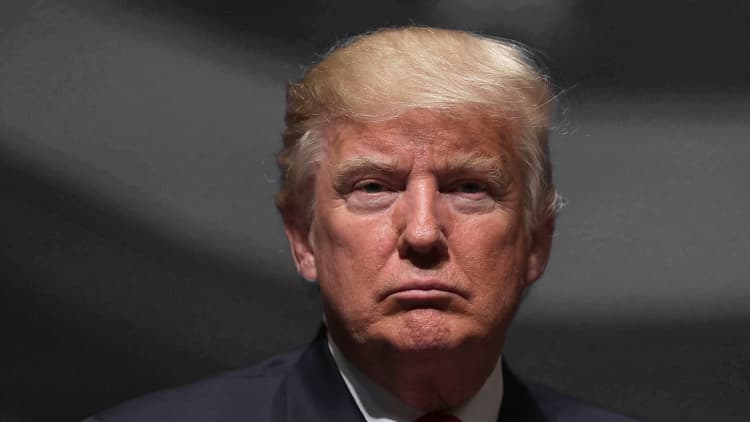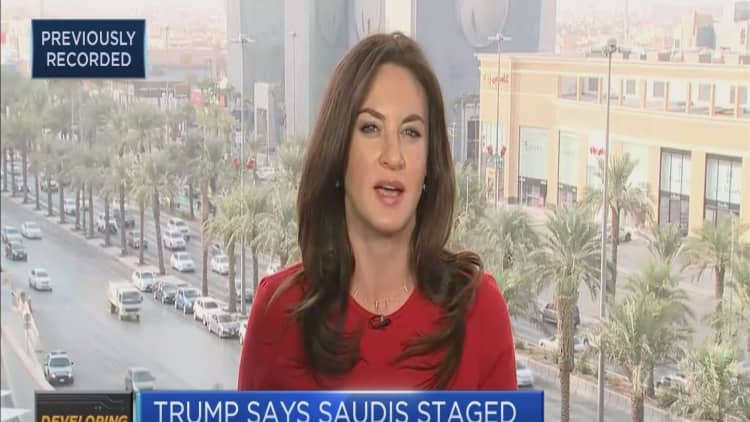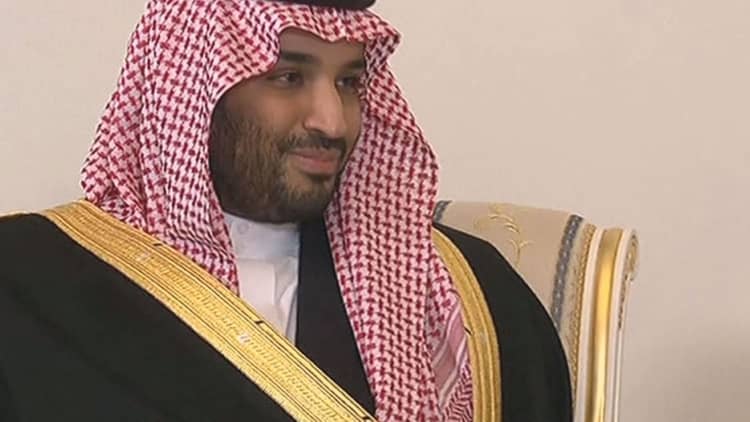
As the world awaits the truth, or something close to it, about Saudi journalist Jamal Khashoggi's killing inside the Saudi Consulate in Istanbul, one of the Gulf's most stalwart security relationships hangs in a precarious position.
Congress and the White House have sharply different views on how to approach the diplomatic crisis, now in its third week. Legislators are loudly calling for sanctions on weapons sales to Saudi Arabia and a robust response if the government in Riyadh is proven to have been behind Khashoggi's death.
Secretary of State Mike Pompeo on Tuesday announced that visas for at least 21 Saudi nationals would be revoked and that he was working with the Treasury Department to "review the applicability of Global Magnitsky Sanctions," individual penalties for human rights abusers.
"These penalties will not be the last word on this matter from the United States," Pompeo told reporters at the State Department. "We will continue to explore additional measures to hold those responsible accountable."
But while President Donald Trump has expressed his desire to get to the bottom of the case, he's appeared more reluctant to punish his allies in the kingdom's leadership, should they be found responsible. Their support is vital in carrying out his agenda to isolate Iran and keep oil prices stable ahead of the November midterm elections.
Khashoggi, a columnist for the Washington Post and frequent critic of the Saudi royal family, disappeared after entering the Saudi consulate in Istanbul on October 2. Turkish officials told The New York Times that it has audio evidence which proves Khashoggi was tortured, killed and subsequently dismembered by a hit team of Saudi agents. After initially insisting that Khashoggi left the consulate unharmed, the Saudi government last week said that he died in a "fistfight" while in the building, but provided few details and no evidence.
Multiple investigations are underway, and Turkey's President Recep Tayyip Erdogan has called for the perpetrators of the crime to be tried in Istanbul, though he's stopped short of accusing the Saudi king or Crown Prince Mohammed bin Salman directly.
Close votes
If the details coming out of the Khashoggi case implicate the Saudi government and the crown prince, Western governments — particularly the U.S. — will be under heightened pressure to punish the Saudis through mechanisms like sanctions on weapons sales or on members of the royal family. That is the most obvious path Congress can take, though it can be done in a few ways, each with its own set of obstacles.
Lawmakers from both parties have in the last year prompted floor votes attempting to choke Washington's support for the kingdom, each time losing by narrow margins.

But a former U.S. national security official with extensive experience in the Gulf, who preferred to remain anonymous due to the sensitivity of the situation, warned that after the midterm elections, the mood toward the Saudis would be much more aggressive than in the past.
Whatever the election's outcome, "I think either way there will be a more skeptical — if not hostile — relationship with Saudi Arabia in the legislature," the former official said. "And the relatively free hand that the administration gave is going to be a little more constrained.
"The Saudis are very lucky that Congress is in recess for campaigning — if Congress were in session there would be hearings, and they would not be good hearings."
'Sanction the hell out of Saudi Arabia'
Republican Sen. Lindsey Graham of South Carolina, a longtime defender of U.S.-Saudi ties, told Fox News last week that the response to the kingdom was up to the president, but added: "What I would do, I know what I'm going to do, I'm going to sanction the hell out of Saudi Arabia."
The Saudis purchased $65 billion in military equipment from Washington under the Obama administration, according to the Congressional Research Service. And Trump has repeatedly cited a $110 billion arms deal signed with the kingdom in May of 2017 as a major engine for U.S. jobs, and a key justification for preserving defense trade between the two. But so far, Riyadh has only purchased $14.5 billion worth of "helicopters, tanks, ships, weapons, and training," according to the Pentagon — the remainder of the $110 billion appears to be more of a vague wish list.
The 'special relationship'
"The most concrete challenge facing the U.S. political establishment is that while there is certainly an inclination to ensure that there's accountability, the U.S.-Saudi relationship is key to U.S. influence in the region," Ayham Kamel, head of Middle East and North Africa for risk consultancy Eurasia Group, told CNBC.
Mutual Saudi-U.S. interests date back to 1933, beginning with Saudi Arabia granting oil exploration rights to American companies, and later providing the U.S. a major source of energy during its crude-strapped World War II years. A security alliance evolved whereby Washington sold arms and provided military training to the Saudis and used the country as a bulwark against Soviet expansion during the Cold War.
This later extended to U.S. protection during former Iraqi President Saddam Hussein's invasion of Kuwait, and the partnership managed to survive both the 1973 OPEC embargo and the September 11 attacks, the latter of which implicated a number of Saudi nationals. The two have continued their security partnership since, with a focus on counterterrorism, despite obvious differences in values and controversies over the funding of terrorism and radical Islamic ideology.
Under former President Barack Obama, relations between Washington and Riyadh cooled. Trump's personal friendship with Mohammed bin Salman seemed to set the relationship back on track, especially as the White House sees the kingdom as central in its efforts to isolate Iran and forge an Israel-Palestine peace plan.
Magnitsky sanctions and halting weapons sales
On October 10, a bipartisan group of more than 20 senators, including the top Democrat and Republican on the Senate Foreign Relations Committee, penned a letter to the White House triggering the Global Magnitsky Act, which is designed to penalize governments for human rights abuses. This gives the administration four months to carry out an investigation and determine whether abuses occurred. It also, however, gives the executive a fair amount of discretion in its response. Pompeo on Monday named the Magnitsky Act among possible measures that may be exacted on the killing's perpetrators.
In the absence of Magnitsky sanctions, however, lawmakers can still resort to direct sanctions of their own via the normal committee process, as they did last year with sanctions on Russia despite Trump's opposition.
And Congress has 30 days to review and attempt to block weapons sales; Sens. Christopher Murphy, a Democrat, and Rand Paul, a Republican, have pledged to offer a joint resolution blocking any potential White House sale of precision-guided munitions to the kingdom. The pair tried this before in June of 2017, but failed to block a munitions sale to Riyadh in a close floor vote of 47-53. There is likely to be more support for a vote in the current climate, though whether the majority would be sufficient to override a presidential veto is uncertain.
Cutting support for the Yemen War
Under the War Powers Resolution, Congress could also vote to halt U.S. military support for missions not initially approved by Congress, such as the Saudi offensive in Yemen. The U.S. currently provides refuelling, intelligence and targeting support to the Saudis, whose aerial bombing campaign and war with Yemen's Houthi rebels has led to tens of thousands of deaths and widespread famine, according to UN reports.

In March, a bipartisan group of senators forced a vote on the War Powers Resolution, losing in a 44-55 vote. In the current environment, appetite for a similar vote may now be stronger.
'The greatest challenge in US-Saudi relations since 9/11'
Still, security experts point out the importance of the two very different countries' shared regional interests.
"The Khashoggi affair is the greatest challenge in U.S.-Saudi relations since 9/11," said Dave DesRoches, an associate professor and senior military fellow at the National Defense University in Washington, DC.
"It is quite possible that there will be various sanctions imposed, but this should not obscure the fact that the U.S. is the oldest and most reliable security partner of the Saudi Arabia, and that Saudi Arabia knows its best prospects for security lay in a close operational and strategic relationship with the U.S.," he said.
Trump and officials in Washington have also expressed concern that pressures may accelerate a Saudi shift eastward, with Russia and China keen to create a wedge between the two allies, though they presently lack the capacity to match the U.S. in terms of weapons provisions and military support.
But it's about a lot more than just weapons, Eurasia Group's Kamel said.
"Saudi Arabia has been the prime ally of the West in the region. You take that out of the equation, then the Middle East looks very, very different. Especially at a time when the U.S. is trying to contain Iranian power, influence, oil exports altogether. How you do that without the Saudis is a big problem I think."
"There no doubt that the U.S.-Saudi relationship will be damaged," he added. "The only question is to what extent."
Correction: Secretary of State Mike Pompeo on Tuesday announced that visas for at least 21 Saudi nationals would be revoked. An earlier version misstated the day.


